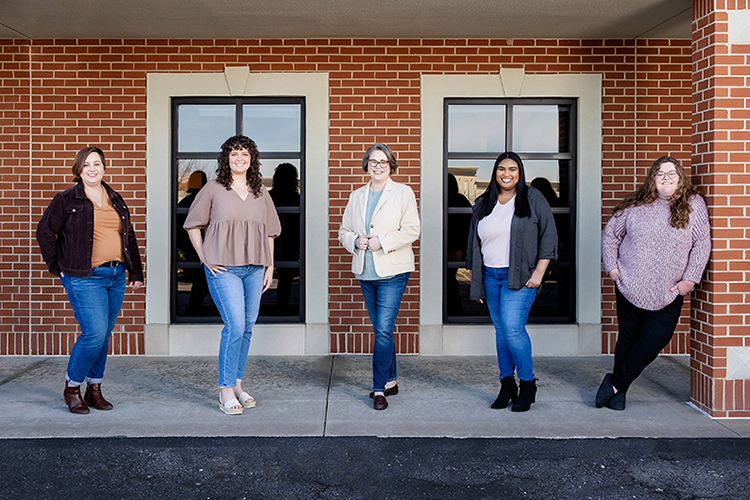

What to Expect
From the time you answer our first on-boarding call you’ll feel at home. We’re trained and licensed professionals, but we’re also just people helping people. We’re committed to your well-being. You can expect confidentiality, collaborative treatment planning, and a meaningful therapy relationship. Complete with comfortable sessions, goal setting, and the convenience of virtual sessions, we prioritize your care.
Frequently Asked Questions
What can I expect during my first therapy session?
Our primary goal during your first session is to help you feel comfortable and heard. We want to understand what you are seeking support for and help set goals for our work together. We respect that not everyone wants to put all of their feelings and thoughts out there to someone they just met and won’t ask you to share anything you aren’t comfortable with.
How much time do I need to spend on therapy sessions?
A typical session is about 50 minutes long. If you and your therapist feel longer sessions are best for you, we can discuss scheduling longer sessions. Our offices are easily accessed on the south side of Columbia, MO, or we can set up video visits to allow you better access to your therapy sessions.
How do I know this is the right therapist for me?
We know that finding the right fit is an important part of therapy. If you feel like your therapist understands your concerns, you feel comfortable being open and honest with them, and you feel respected during sessions then you are on the right track! Take a look at our team of therapists here to see who may be a good fit for you. When we reach out to you to schedule your first appointment, we will discuss preferences and make recommendations based on our therapists’ skills and approaches to help find the right fit for you. Sometimes the first therapist you try isn’t the right fit. If not, please contact us, so we can help you find a therapist who is a better fit for you.
How often will I need to attend therapy?
Every person is different. Some benefit from weekly sessions, while other clients see us monthly or just as needed as they move through different stages and seasons of their lives. If you’re needing daily access to a therapist, we may not be the right fit for you and can help refer you to a setting with this level of support.
How does billing work?
Sessions are billed the day of. We do not accept insurance (here’s why). However, we do accept HSA cards, PAS EAP, and major debit/credit cards. If you have other billing needs, feel free to give us a call to further discuss your needs.
How do I know if therapy is right for me?Determining if therapy is right for you is a personal decision that depends on your individual needs and circumstances. However, therapy can be beneficial for anyone who is experiencing difficulties in their life, whether they are struggling with stress, anxiety, depression, relationship issues, or simply seeking personal growth and self-discovery.
Do I need to be in crisis or have a mental health diagnosis to be in therapy?
While some people come to therapy with specific goals or diagnoses that they need treatment for, not everyone is in that situation. Since we do not take insurance, we are happy to assist you with your personal growth and development, without requiring a diagnosis. Having a pre-existing relationship with a therapist that you built when you aren’t in crisis can help when crises do appear.
If you find yourself feeling overwhelmed, stuck, or unable to cope with life’s challenges on your own, therapy may provide you with the support and guidance you need to navigate these obstacles. Additionally, therapy can offer a safe and confidential space for you to explore your thoughts, feelings, and experiences, free from judgment.
Ultimately, the decision to pursue therapy is yours to make, but it may be worth considering if you are looking for a way to improve your overall well-being, develop coping skills, and enhance your quality of life. If you’re unsure whether therapy is right for you, reaching out to a therapist for a consultation can help you explore your options and make an informed decision based on your unique needs and goals.

What types of therapy do you offer?
Cognitive Behavior Therapy (CBT) Therapy
Focuses on identifying and changing negative thought patterns and behaviors to improve mood and behavior.
Motivational Interviewing
A process of working alongside an individual to find what motivates them to change the behaviors that are preventing them from making healthier choices.
Acceptance and
Commitment (ACT) Therapy
A mindful psychotherapy helping you stay focused on the present to accept thoughts and feelings without judgment.
Gottman Method Therapy
With goals to disarm conflicting verbal communication; increase intimacy, respect, and connection; remove barriers that create a feeling of stagnancy, the Gottman method helps create a heightened sense of empathy and understanding within the context of the relationship.



How do I know if I’m making progress in therapy?
Progress in therapy is a highly individualized and subjective experience. We work with you to develop goals and objectives that are unique to you and work within your life to track progress effectively and ensure that therapy remains aligned with your needs.

Meet
Our Therapists
Become
a Client
Take the first step toward a better life by booking a discovery session today.
